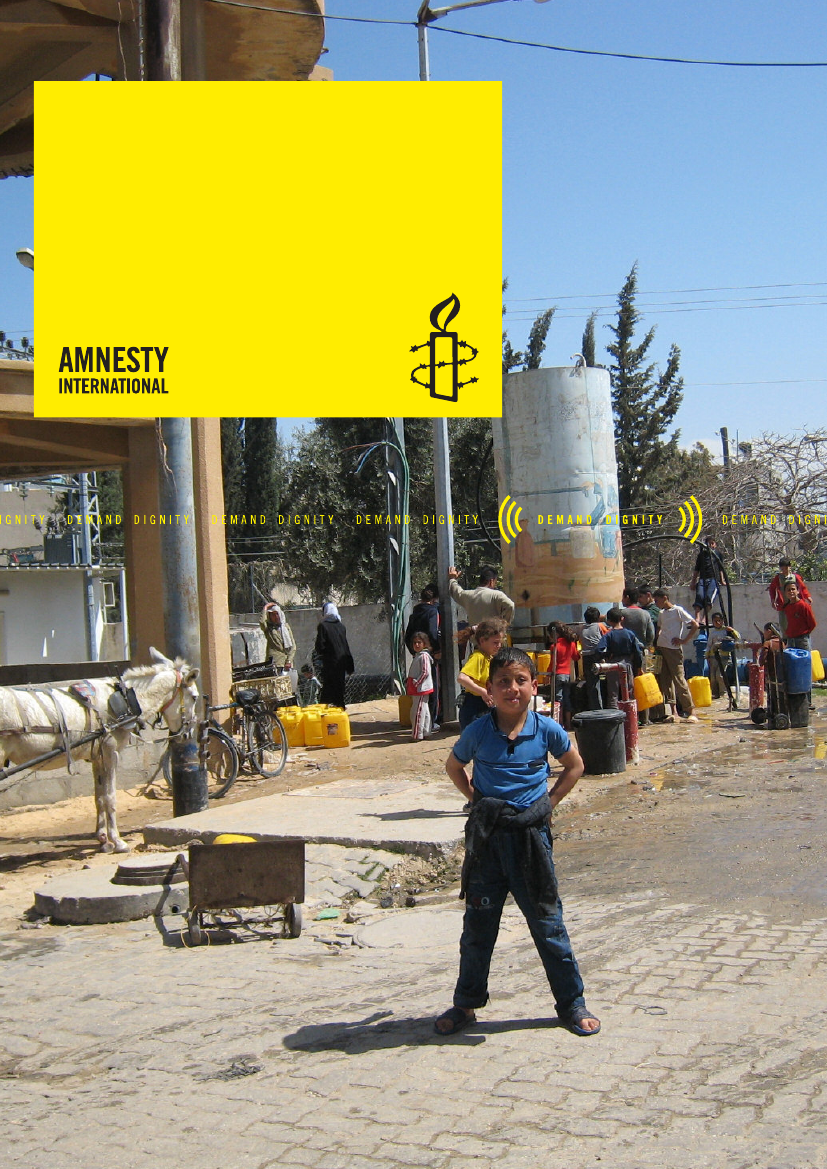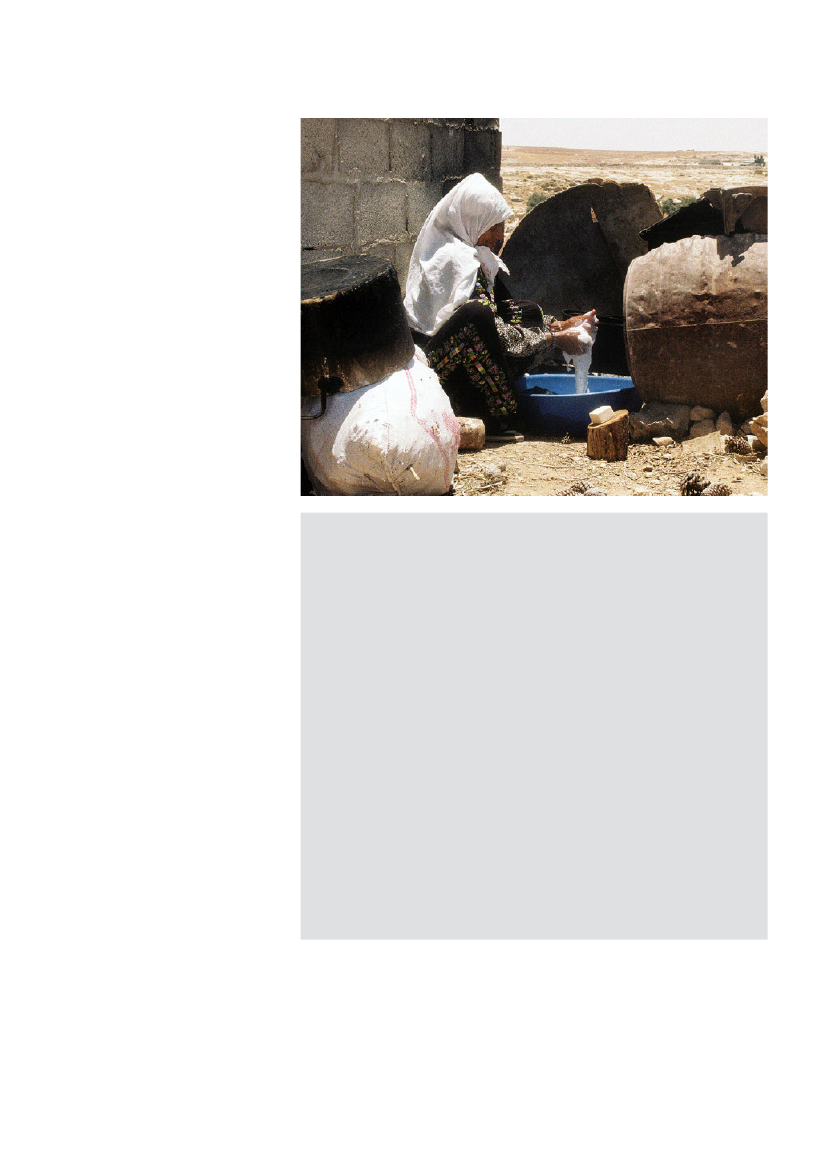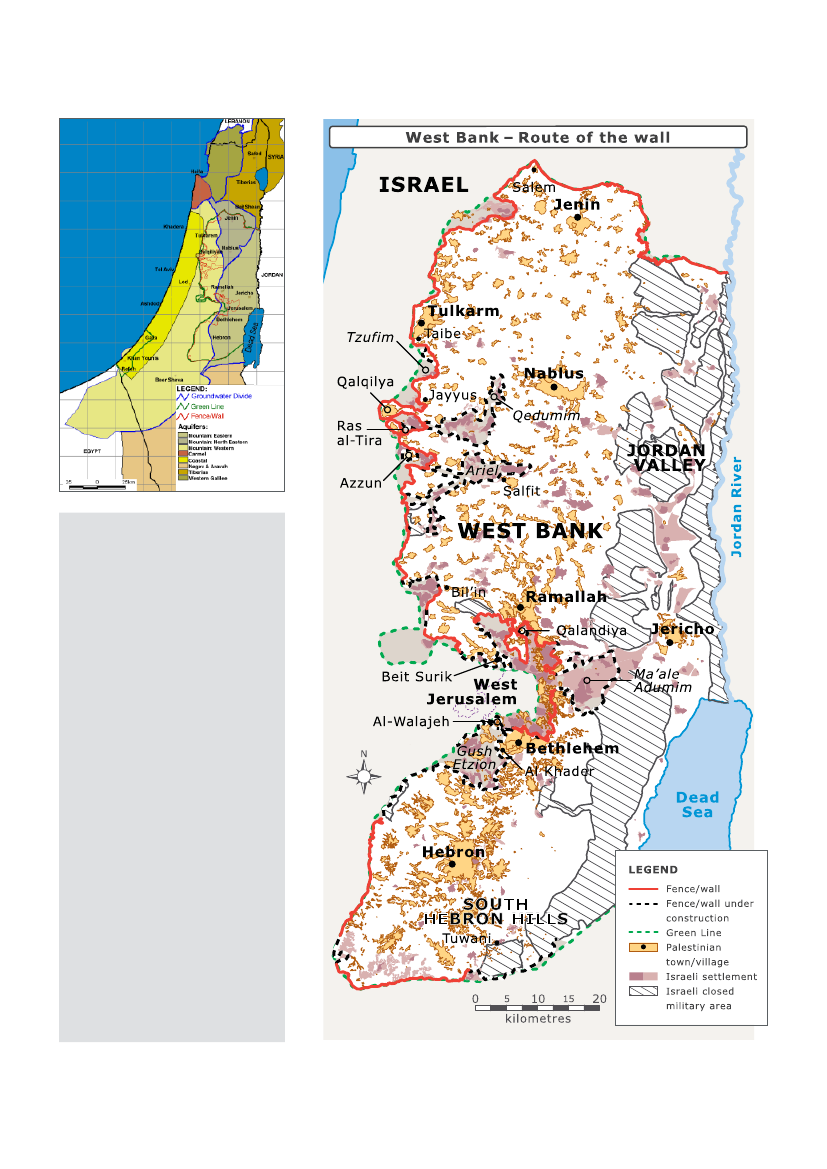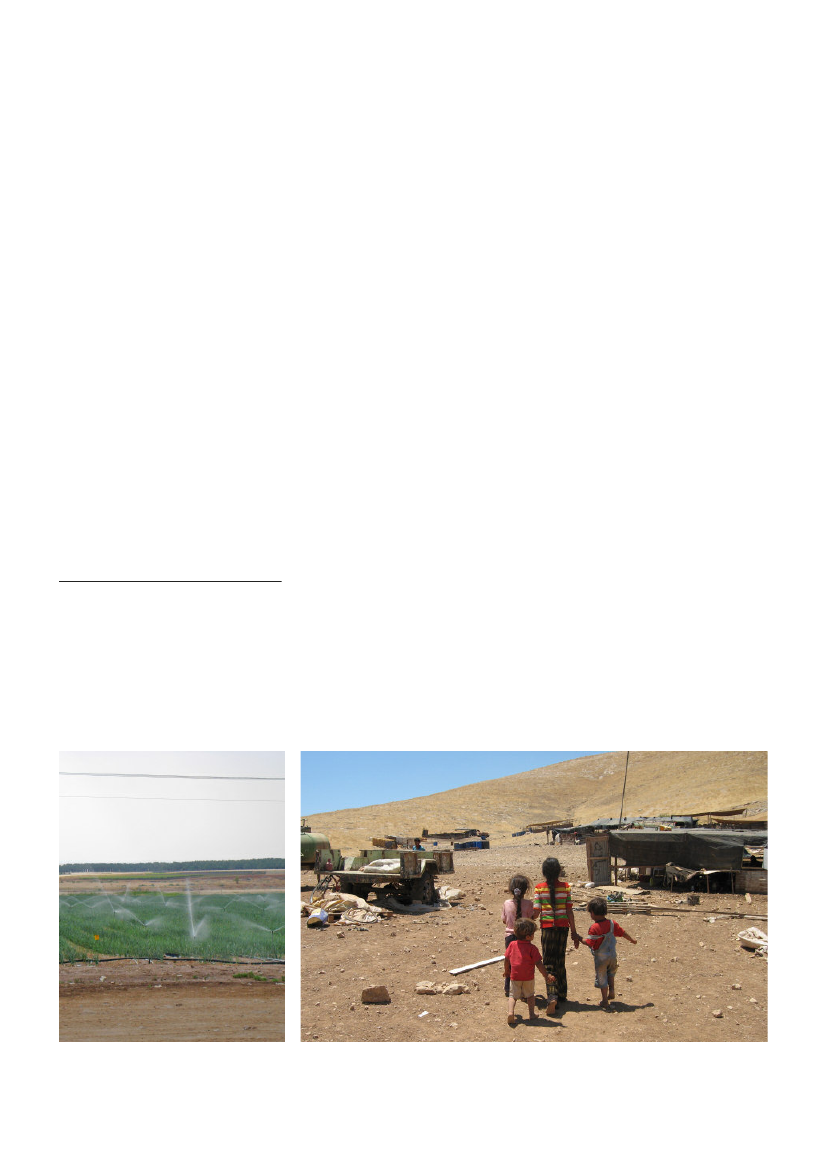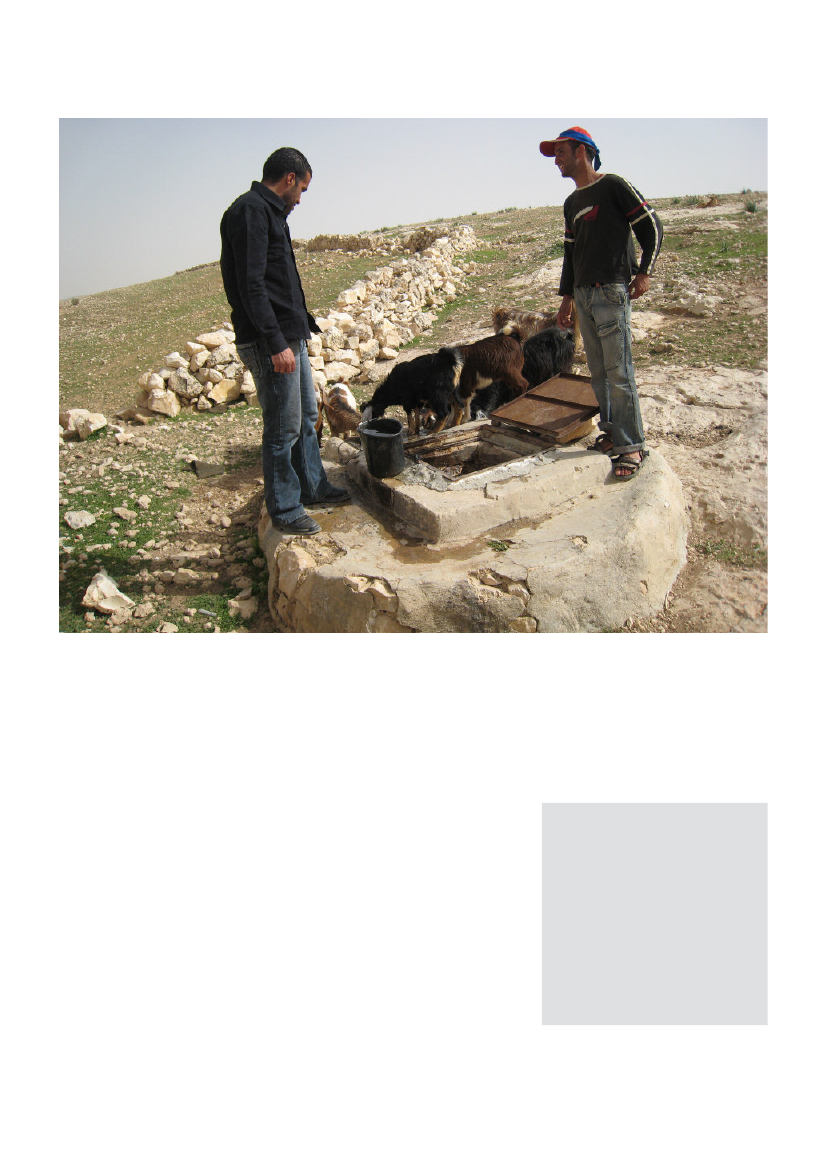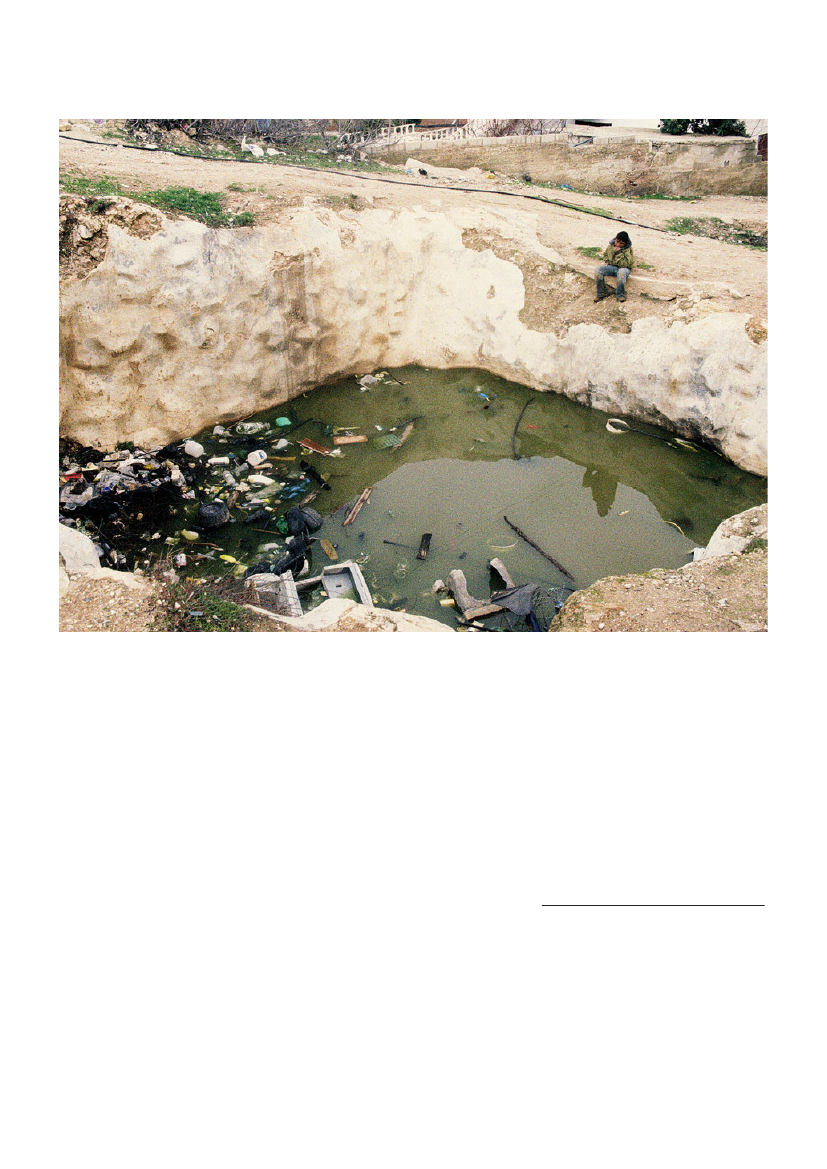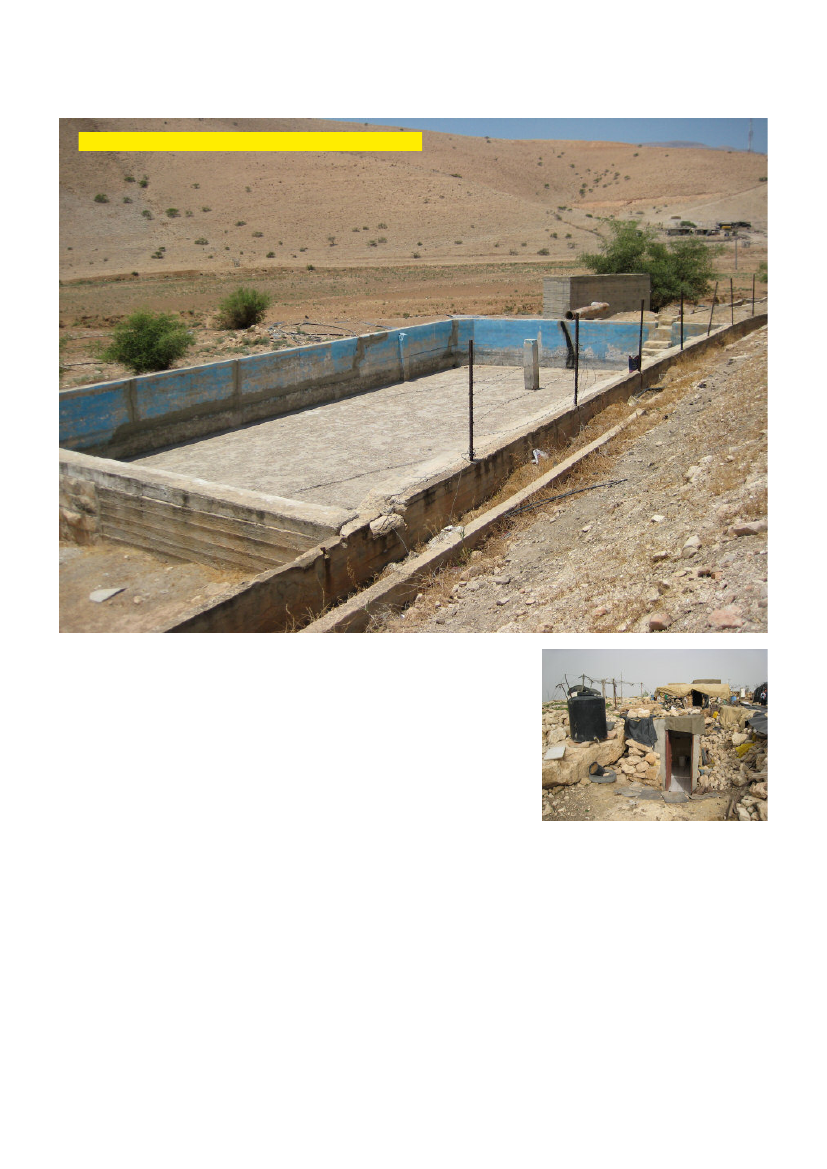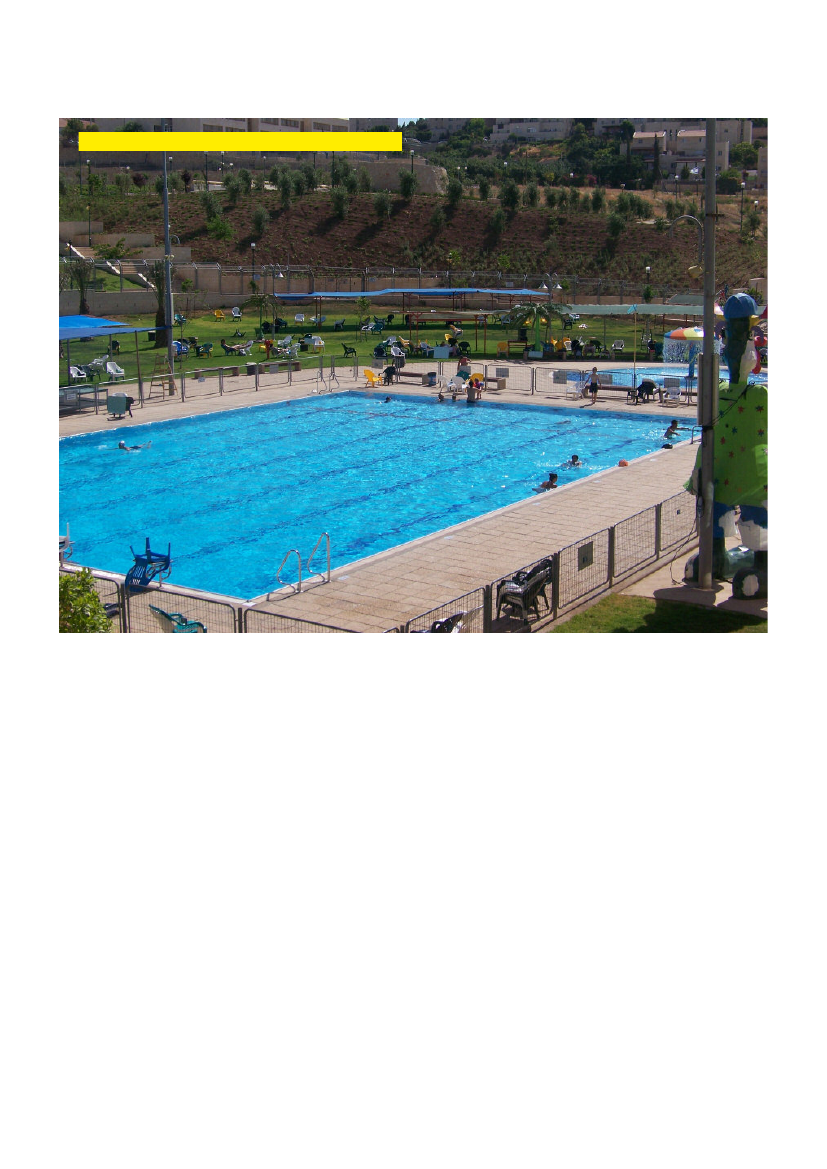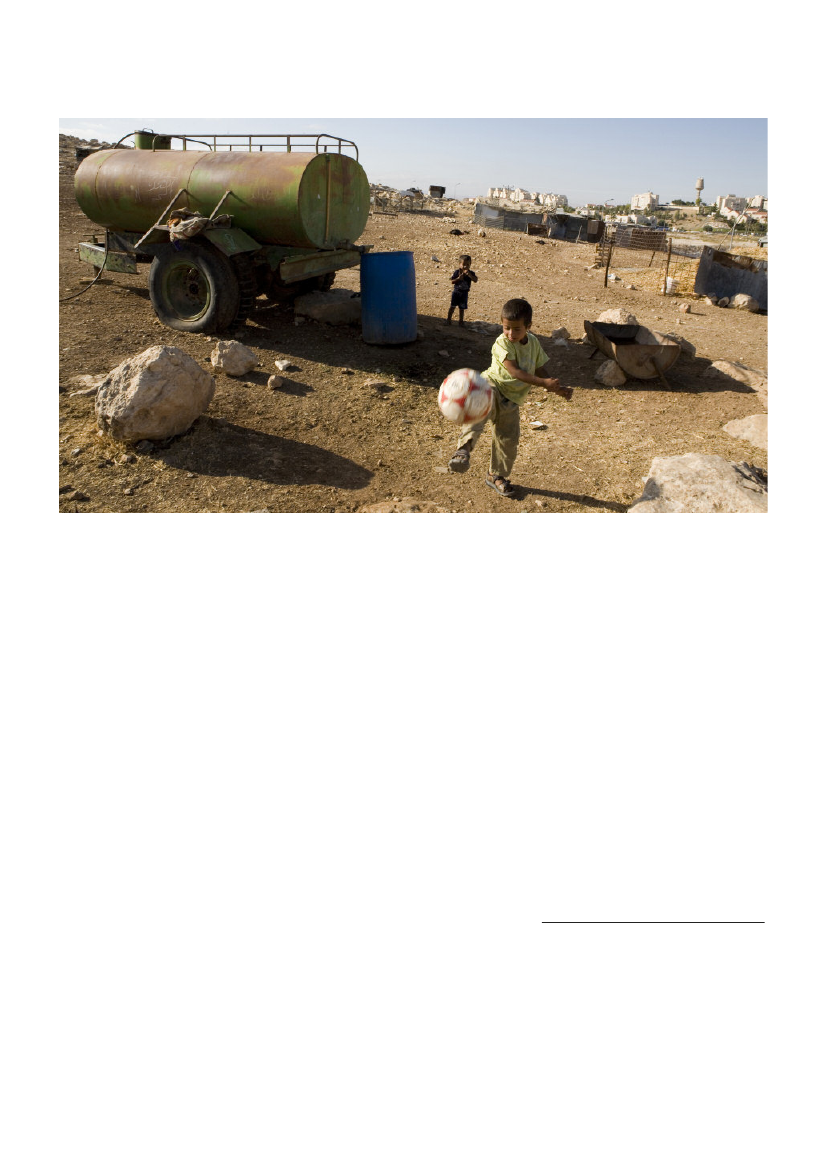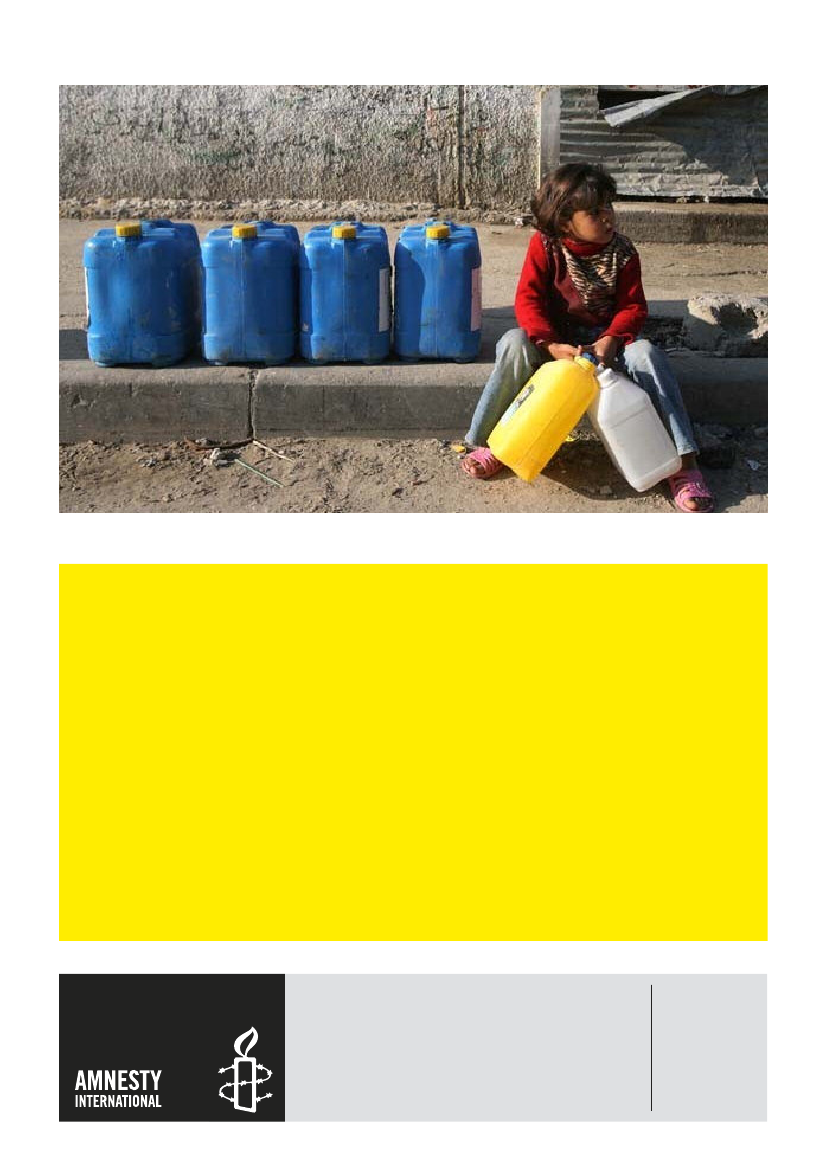Udenrigsudvalget 2009-10, Det Udenrigspolitiske Nævn 2009-10
URU Alm.del Bilag 25, UPN Alm.del Bilag 5
Offentligt
PALESTINIAN ACCESSTO WATER RESTRICTEDWATER IS A HUMAN RIGHT
THIRSTING FOR JUSTICE
� Amnesty International
2THIRSTING FOR JUSTICE
PALESTINIAN ACCESS TO WATER RESTRICTED
Palestinians in the Occupied Palestinian Territories (OPT) do not have access to adequate, safewater supplies. This long-standing problem has significantly hindered social and economicdevelopment in the OPT and denied many communities their rights to an adequate standard of livingand to food, health and work. Palestinian per capita water consumption remains below acceptableinternational standards for the protection of public health. Chronic water shortages affect crucialaspects of life including hygiene, agricultural and industrial activities, and livestock rearing.
Discriminatory Israeli policies in the OPTare the root cause of the striking disparityin access to water between Palestiniansand Israelis. Palestinian water consumptionbarely reaches 70 litres a day per person –well below the World Health Organization’s(WHO) recommended daily minimum of100 litres per capita. By contrast, Israeli(daily per capita) consumption is fourtimes as much.The inequality is even more pronouncedbetween Palestinian communities andunlawful Israeli settlements, establishedin the OPT in violation of international law.Swimming pools, well-watered lawnsand large irrigated farms in Israeli settlementsin the OPT stand in stark contrast next toPalestinian villages whose inhabitants struggleeven to meet their essential domestic waterneeds. In parts of the West Bank, Israelisettlers use up to 20 times more water percapita than neighbouring Palestiniancommunities, who survive on barely 20 litresof water per capita a day – the minimumamount recommended by the WHO foremergency situations response.Israel controls and restricts Palestinianaccess to water in the OPT to a level whichneither meets their needs nor constitutesa fair distribution of shared water resources.Israel uses 80 per cent or more of thewater from the Mountain Aquifer, thePalestinians’ sole remaining water resource,which is replenished almost entirely bythe rainfall over the West Bank. Israel hasentirely appropriated the Palestinians’
share of the Jordan River. It also hasadditional water resources which arenot shared with the Palestinians.Some 180,000-200,000 Palestinians inrural areas in the occupied West Bank haveno access to running water. Even in townsand villages which are connected to thewater network, the taps often run dry. Waterrationing is especially common during thesummer months. In many places Palestiniansreceive water only one day per week or everyfew weeks, in some areas not for months ata time. When their taps run dry, Palestiniansmust buy additional water brought in bywater tankers at a much higher price.Many communities not connected to thewater network must travel miles to find waterthat is expensive and often of dubious quality.The impact of water shortages and poorsanitation services in the OPT is most oftenfelt by the most vulnerable communities:those living in isolated rural areas and inovercrowded refugee camps. In recentyears unemployment and poverty haveincreased and disposable income has fallenin the OPT. As a result, Palestinian familieshave to spend an ever higher percentageof their income on water.In Gaza, some 90-95 per cent of the watersupply is contaminated and unfit for humanconsumption. Israel does not allow water tobe transferred from the West Bank to Gaza,and Gaza’s only water resource, the CoastalAquifer, is insufficient for the needs of thepopulation and is being increasingly depleted
CONTROL OF WATER IN THEOCCUPIED WEST BANKIsrael determines the amount of waterPalestinians can extract from the sharedaquifer and the locations where extractioncan take place.Israel controls the collection of rain orspring water throughout most of the WestBank. Rainwater harvesting cisterns areoften destroyed by the Israeli army.Palestinians are not allowed to drillnew wells or to rehabilitate old wellswithout permits from the Israeli authorities.Such permits are difficult and oftenimpossible to obtain. Even pipelinesconnecting wells to Palestinian townsand villages require Israeli permits.The Israeli army controls access tothe roads which water tankers mustuse to deliver water to those Palestinianvillages not connected to the waternetwork. Many roads are closed or restrictedto Palestinian traffic, causing delaysor forcing the tankers to make longdetours which significantly increase theprice of water.These restrictions make it excessivelydifficult for Palestinians to access waterand to develop and maintain the water andsanitation infrastructure.
WATER IS A HUMAN RIGHTAmnesty International October 2009Index: MDE 15/028/2009
THIRSTING FOR JUSTICEPALESTINIAN ACCESS TO WATER RESTRICTED
3
� Shabtai Gold/IRIN
right:A Palestinian woman in Samua, in thesouth of the occupied West Bank, washesclothes outdoors using water from a tanker asher house is not connected to the water network.cover:Residents collect drinking water at apurification plant in Khan Yunis, Gaza Strip.Some 90 per cent of the water available inGaza is polluted and unsuitable for drinking.
by over-extraction and contaminated bysewage and seawater infiltration. Stringentrestrictions imposed by Israel on the entryinto Gaza of materials and equipmentnecessary for the development and repair ofinfrastructure have led to a markeddeterioration in the water and sanitationsituation there.During more than four decades ofoccupation, Israel has over-exploited waterresources and neglected water and sanitationinfrastructure in the OPT. It has also used theOPT as a dumping ground for its waste –resulting in the pollution of groundwaterresources. Urgent action is needed to ensurean adequate and equitable water supply forthe Palestinian population and to preventfurther resource and environmental damage.Due to Israel’s failure to fulfil its obligationsas the occupying power, the burden ofmeeting these challenges has fallen tointernational donors and, following itsestablishment in the mid-1990s, thePalestinian Water Authority (PWA).The PWA has extremely limited control overwater resources in the West Bank. Underthe Oslo Accords, it merely acquired theresponsibility of managing an inadequatewater supply. The amount of water whichthe Palestinians may extract from theshared aquifer is controlled by Israel, asare decisions relating to drilling or upgradingwells and implementing other water-relatedprojects. The activities of the PWA aresubject to restrictions imposed by Israel
ISRAEL’S OBLIGATIONS UNDER INTERNATIONAL LAWBy virtue of its military occupation of the OPT,Israel must comply with both internationalhuman rights and humanitarian law in theOPT. Although Israel disputes this, theinternational community, including all relevantUN human rights bodies, have repeatedlyaffirmed that Israel is bound by internationalhuman rights and humanitarian law in itsconduct in the OPT and have repeatedly urgedIsrael to honour its obligations.Israel, as the occupying power, has welldefined responsibilities to respect thePalestinians’ human rights, including theright to an adequate standard of living –which encompasses the right to water andfood – the right to health and the right towork. It must not only refrain from takingactions that violate these rights. It must alsoprotect the Palestinian population frominterference with their rights by privateindividuals and take deliberate, concrete andtargeted steps to ensure that these rights arefully realized.The Military Orders seizing control ofPalestinian water resources in the OPT issuedby the Israeli army soon after it occupiedthe area (Military Orders 92 and 168 of Juneand November 1967, and Military Order 291of December 1968) remain in force today.The 1993 Oslo Accords did not change thelegal status of the OPT, which remain underIsraeli occupation and effective control.Indeed, the Accords specifically stipulate:“The issue of ownership of water and sewagerelated infrastructure in the West Bank willbe addressed in the permanent statusnegotiations” (Article 40). The permanentstatus negotiations, which were scheduledfor the late 1990s, have not yet taken place.
and are dependent on funding byinternational donors. These constraintshave been compounded by poor governance,fragmented management and internal
divisions in the PWA. Donors have generallybeen reluctant to expose and effectivelyaddress obstacles which hinder the deliveryof water projects.
WATER IS A HUMAN RIGHTIndex: MDE 15/028/2009Amnesty International October 2009
4THIRSTING FOR JUSTICE
PALESTINIAN ACCESS TO WATER RESTRICTED
� Amnesty International
� Amnesty International
AQUIFERS INISRAEL/OPT
TERRITORIAL JURISDICTIONUNDER THE OSLO ACCORDSThe Oslo Accords divided the West Bank intoAreas A, B and C. In Areas A and B the Israeliarmy devolved responsibility to the PalestinianAuthority (PA) for civil affairs, that is forproviding services to the population. The twoareas together include some 95 per cent ofthe Palestinian population of the West Bankbut account for only 40 per cent of the land.In Area C, the Israeli army retains fulljurisdiction for all matters. This area accountsfor 60 per cent of the West Bank, includingall the West Bank land reserves and accessto water resources, and all the main roads.Areas A and B are not contiguous butfragmented into enclaves surrounded by Israelisettlements, settlers’ roads and Area C. Thesearrangements have impeded the developmentof an efficient water and sanitationinfrastructure. Most Palestinians live in Areas Aand B, but the infrastructure which servesthem is located in or passes through Area C.Palestinians’ movement in Area C is eitherrestricted or denied, and construction ordevelopment activities are rarely permitted bythe Israeli army.
WATER IS A HUMAN RIGHTAmnesty International October 2009Index: MDE 15/028/2009
THIRSTING FOR JUSTICEPALESTINIAN ACCESS TO WATER RESTRICTED
5
DENYING WATER AS A MEANSOF EXPULSION“No household should be deniedthe right to water on the groundsof their housing or land status.”UN Committee on Economic, Social and Cultural Rights,General Comment No.15 – The Right to Water
On 4 June 2009, the Israeli army destroyedthe homes and livestock pens of 18Palestinian families in Ras al-Ahmar, a hamletin the Jordan Valley area of the West Bank.More than 130 people were affected, manyof them children. Crucially, the soldiersconfiscated the water tank, tractor and trailerused by the villagers to bring in water. Theywere left without shelter or a water supplyat the hottest time of the year.This was the latest of many such incidentstargeting Palestinian communities in the area.On 28 July 2007, Israeli soldiers at a military
checkpoint confiscated the tractor and watertanker of Ahmad Abdallah Bani Odeh, avillager from the nearby hamlet of Humsa.He was driving to the ‘Ain Shibli spring tocollect water for his village. The soldiers toldthe villagers that, to retrieve the vehicles,they would have to sign a pledge to leave andnot return to the area, and pay a fine of 4,500shekels (approximately US$1,000), a sumbeyond the means of people living on lessthan US$2 a day. The villagers did eventuallyrecover their tractor and water tanker, afterthey moved to a different area and paid areduced fine.An Israeli army official told AmnestyInternational that the water tanker and tractorwere confiscated because they enabled thevillagers to remain in the area, which thearmy had declared a “closed military area”.A few days later soldiers confiscated the othertractor belonging to the villagers.In recent years the homes of Palestiniansliving in Humsa, Hadidiya, Ras al-Ahmar andother areas in the Jordan Valley have beenrepeatedly destroyed and their water tankersconfiscated. Each time, the homes – tentsand simple shacks made of metal and plasticsheets – are rebuilt. Because of the villagers’determination to remain on their land despiteextremely harsh living conditions, the Israeliarmy has increasingly restricted their accessto water as a way of forcing them to abandonthe area.
Although there are large wells nearby, theseare for the sole use of Israeli settlers in theRo’i, Beka’ot and Hamdat settlements. Toobtain water the Palestinian villagers musttravel up to 20km to buy small quantities.In recent years the Israeli army has dugditches which prevent passage between thevillages and surrounding areas. It has alsoinstalled checkpoints on the main roadswhere passage for Palestinians is severelyrestricted. These restrictions have madereaching sources of water more difficult andmore expensive for Palestinians in the area.They have to make long detours and oftenhave to wait at checkpoints, where they riskhaving their water tankers confiscated.In Hadidiya, In’am Bisharat, a mother ofseven, told Amnesty International:“We live in the harshest conditions, withoutwater, electricity or any services. The lackof water is the biggest problem. The menspend most of the day…[going] to get waterand they can’t always bring it. But we haveno choice. We need a little bit of water tosurvive and to keep the sheep alive. Withoutwater there is no life. The [Israeli] army hascut us off from everywhere…We don’tchoose to live like this; we would also liketo have beautiful homes and gardens andfarms, but these privileges are only for theIsraeli settlers… we are not even allowedbasic services.”
below:Irrigation sprinklers wasting water in themidday sun in Israeli settlements in theoccupied Jordan Valley, while neighbouringPalestinian villages struggle to access waterfor drinking and other basic needs.below right:Children outside their homes,which face demolition by Israel, in Humsa(formerly Hadidiya), Jordan Valley.
� Amnesty International
� Amnesty International
WATER IS A HUMAN RIGHTIndex: MDE 15/028/2009Amnesty International October 2009
6THIRSTING FOR JUSTICE
PALESTINIAN ACCESS TO WATER RESTRICTED
� Amnesty International
Because their access to water is severelyrestricted, villagers are unable to cultivatethe land, or even to grow small amounts offood for their personal consumption or foranimal fodder, and have thus been forcedto reduce the size of their herds.Historically, Palestinians in the Jordan Valleyearned their livelihood from farming, herdinggoats and sheep, and selling the milk andcheese they produced. In recent years thelack of water has made it impossible forvillagers to farm the normally fertile land orto keep more than a few animals – now theironly means of livelihood. The lack of waterhas already forced many villagers to leavethe area and the survival of the communitiesis increasingly threatened.
By contrast, the Israeli settlementsestablished on occupied Palestinian land inviolation of international law have unlimitedaccess to water to irrigate vast tracts offarmland. Irrigated agriculture is the maineconomic activity in Israeli settlements inthe West Bank and most of the produce isexported. The green expanses of the illegalIsraeli settlements beside the parchedPalestinian villages provide a strikingexample of Israel’s discriminatory policytoward Palestinians in the OPT.While Palestinian villagers face a dailystruggle to find enough water for their basicneeds, in nearby Israeli settlements irrigationsprinklers water the fields in the midday sun,when most water is wasted as it evaporatesbefore even reaching the ground.
RAINWATER HARVESTINGPROHIBITEDRural communities which are not servedby water networks rely on harvesting rainwater for both domestic and farmingneeds. Depending on the amount of yearlyrainfall, the water collected in the
Rainwater harvesting cisterns have beenused in the region for centuries. Cisterns aremostly small, with an average capacity of50m3. They are built in the ancientNabataean tradition, dug in the ground in acircular or square shape, lined with stones orcement to prevent leakages, and with anopening that is kept closed when not in use toprevent evaporation and contamination. Therun-off rainwater is collected in the cisternsduring the rainy season and stored for useduring the dry season.
WATER IS A HUMAN RIGHTAmnesty International October 2009Index: MDE 15/028/2009
THIRSTING FOR JUSTICEPALESTINIAN ACCESS TO WATER RESTRICTED
7
� Shabtai Gold/IRIN
underground cisterns during the rainyseason can provide families with severalmonths’ supply. When the collectedrainwater runs out, the villagers buyadditional supplies from tankers and storeit in the cisterns.On 15 January 2008, Israeli forcesdemolished nine rainwater cisterns nearthe village of Beit Ula, north-west ofHebron. The cisterns were built in June2006 as part of an agricultural project toimprove food security, and they belongedto nine families. The project was fundedby the European Union via two local non-governmental organizations, thePalestinian Agricultural Relief Committeesand the Palestinian Hydrology Group.Under the scheme the land was levelled inthe traditional terrace style and 3,200trees were planted including olive, almond,lemon and fig trees. The cisterns were a
vital part of the project, with each cisternintended to provide water for a plot of 10-12 dunums (1-1.2 hectares). The farmershad also contributed a significant portionof the overall cost of the project.One of the farmers, Mahmoud al-‘Adam,told Amnesty International:“We invested a lot of money and workedvery hard on this project. This is goodland and it was a very good project.We put a lot of thought into how to shapethe terraces and build the cisterns inthe best way, to make the best use of theland, and we planted trees which needlittle water… even if there was notenough rain this year to fill the cisterns,the water harvested was useful for thesaplings; they were growing well... But[the Israeli army] destroyed everything;they went up and down several times
above left:Shepherds in the village of Ummal-Kheir, in the south of the occupied WestBank. Herding communities are notconnected to the water network and relyon the harvesting and storage of rainwaterusing cisterns like this, which are oftendestroyed by the Israeli army.above:Precious water in the occupied WestBank is polluted and no longer useable after arainwater harvesting cistern belonging toPalestinian villagers was destroyed by theIsraeli army under the pretext that it was builtwithout a permit. Permits for water projects arerarely granted to Palestinians.
with the bulldozer and uprootedeverything… It is very painful for meevery time to come here and see thedestruction; everything we worked foris gone. Why would anyone want to dothis? What good can come from [it]?”
WATER IS A HUMAN RIGHTIndex: MDE 15/028/2009Amnesty International October 2009
8THIRSTING FOR JUSTICE
PALESTINIAN ACCESS TO WATER RESTRICTED
� Amnesty International
AN EMPTY WATER RESERVOIR FOR PALESTINIANS...
VULNERABLE COMMUNITIESTARGETED - SOUTHERNHEBRON HILLSIn the southern Hebron Hills, Palestinianvillagers depend largely on sheep and goatherding for their livelihoods. In recent yearsthey have faced the growing challenge ofprolonged drought, which has reduced boththe supply of water they are able to collectduring the rainy season and the yield offodder crops and grazing plants. Increasedrestrictions imposed by the Israeli army onthe villagers’ access to water and grazingland have worsened their situation.In the Palestinian village of Susya, mostof the water cisterns were demolished bythe Israeli army in 1999 and 2001, alongwith dozens of homes. The remainingcisterns and even a latrine have demolitionorders pending.
� Amnesty International
The water cisterns, some of them centuriesold, were blown up or smashed withbulldozers and filled with gravel and cement,making it impossible to repair them. Thewater heating solar panels which had beendonated to the villagers were also smashed.
“Water is life. Without water wecannot live; not us, not theanimals, or the plants. Beforewe had some water, but afterthe army destroyed everythingwe have to bring water from faraway; it’s very difficult andexpensive. They make our lifevery difficult, to make us leave.”Fatima al-Nawajah, a resident of Susya, speaking toAmnesty International
top:A water reservoir stands empty in Jiftlik, aPalestinian village in the occupied Jordan Valley,whose residents depend on agriculture but faceincreasing restrictions in accessing water.above:A toilet in the Palestinian village ofSusya, in the occupied West Bank, threatenedwith demolition by the Israeli army.right:Israeli settlers enjoy the swimming poolin the Maaleh Adumim settlement, unlawfullyestablished in the occupied West Bank inviolation of international law.
WATER IS A HUMAN RIGHTAmnesty International October 2009Index: MDE 15/028/2009
THIRSTING FOR JUSTICEPALESTINIAN ACCESS TO WATER RESTRICTED
9
� Angela Godfrey-Goldstein
A FULL SWIMMING POOL FOR ISRAELI SETTLERS
Officially, as in other cases, the structureswere demolished because they lackedpermits – permits which the Israeli armysystematically refuses to grant toPalestinians in the area. The aim was toexpel the population from the village inorder to make way for the expansion of theIsraeli settlement of Sussia.The expansion of Sussia in the 1990scoincided with increased harassment ofPalestinian communities by the settlers andefforts by the army to expel them. Since theIsraeli army destroyed most of their caves –historical structures thousands of years old– the Palestinians have been living in tentsand shacks and are constantly at risk ofbeing forced out of the area. More than halfhave already been forced to leave, manyafter the destruction of the water cisterns in1999 and 2001 and others following waterand land restrictions imposed since then.
“I am sitting here holding in my handsmetal spikes that were used today by Israelisettlers to sabotage a truck carrying water[supplied by the international aidorganization Oxfam) to the nearby Palestinianvillage of Susya. This entire area has beenaffected by serious drought, and the waterbrought by Oxfam is a necessity. Dozens ofspikes were placed across the road beforethe time of the water truck’s regularlyscheduled arrival. The truck was disabled,three tyres punctured… After a delay, thedriver was able to deliver the water.”Joel Gulledge, Christian Peacemakers Team, 12September 2006
with the perennial water shortages.The water tanks have often been targetedby Israeli soldiers.“My paratrooper friends used to tell methat they lay on roofs in Nablus andshoot the water tanks in order to see howthey explode...”Rank: First Sergeant, Unit: "Sting"
When asked why Palestinian rooftop watertanks have been shot at, a soldier whoserved in the OPT told Amnesty International:“Water tanks are good for target practice;they are everywhere and are the right sizeto aim at and calibrate your weapon, torelieve your frustration, to teach a lessonto the kids of the neighbourhood whothrew stones at you and you couldn’tcatch; or to break the monotony of a stintof guard duty.”
SHOOTING AT WATER TANKS FOR‘TARGET PRACTICE’Most Palestinian houses in the OPT havewater storage tanks on the roofs to cope
WATER IS A HUMAN RIGHTIndex: MDE 15/028/2009Amnesty International October 2009
10THIRSTING FOR JUSTICE
PALESTINIAN ACCESS TO WATER RESTRICTED
� Amnesty International
� Amnesty International
� Amnesty International
WATER INFRASTRUCTUREDESTROYEDDuring the 22-day Israeli militaryoffensive in December 2008-January2009 (Operation “Cast Lead”), Israeliattacks caused some US$6 million worthof damage to water and wastewaterinfrastructure in Gaza. Four waterreservoirs, 11 wells, and sewage networksand pumping stations were damaged and20,000 metres of water mains weredamaged or destroyed by Israeli tanksand bulldozers. Sewage treatment plantsin north and central Gaza were damaged,resulting in raw sewage flooding morethan a square kilometre of agriculturaland residential land, destroying cropsand causing a health hazard.In April 2009 the UN Office for theCoordination of Humanitarian Affairsreported that water test results releasedin March showed that 14 per cent ofwater samples taken in Februarythat year were contaminated, andexpressed concerns about watercontamination from toxic munitionssuch as white phosphorus.
Destruction of and damage to waterinfrastructure have regularly accompaniedIsraeli military attacks in the OPT in recentyears. In one incursion in late January-earlyFebruary 2003 in Rafah, the southernmostand poorest town in Gaza, Israeli forcesdestroyed two public wells which provideddrinking water for half of the town’s120,000 residents.The wells were among 102 wells destroyed bythe Israeli army in the Gaza Strip in less thana year, between 1 July 2002 and 31 March2003. As a result, residents had to rely onalternative, often unsafe water sources suchas agricultural wells, which are not intendedas a supply of drinking water and as such arenot monitored or adequately chlorinated bythe water authorities.In a needs-assessment report in thewake of incursions in May 2004, UN aidagencies reported:“In the aftermath of the May incursions,public health degenerated as a consequenceof damage to water and sewage networksand overcrowded facilities. The Ministry ofHealth clinic in Tal es Sultan reported that,
between 1-17 May, 848 children – around50 per day – were brought to the clinicsuffering from ailments including diarrhoeaand skin diseases…Between 22 and 31May…1,363 children – 151 per day – werebrought to the clinic.”Attacks in reprisal and other deliberateattacks by Israeli forces on water facilitiesand infrastructure in the OPT, and on powerand other facilities which directly affectthe supply and quality of water, violateinternational humanitarian law.
above left:A sewage facility in northern Gazabombed in an Israeli attack in December2008/January 2009.above right top:A water pump and well in theZaytoun neighbourhood of Gaza City destroyedin an Israeli attack in January 2009.above right bottom:Large amounts of sewageare pumped daily into the MediterraneanSea as the overstretched Gaza infrastructurefails to cope with sanitation needs. TheIsraeli blockade of Gaza prevents the importof badly needed material and equipmentto build and maintain the water andsanitation infrastructure.
WATER IS A HUMAN RIGHTAmnesty International October 2009Index: MDE 15/028/2009
THIRSTING FOR JUSTICEPALESTINIAN ACCESS TO WATER RESTRICTED
11
� Keren Manor/Activestills.org
BLOCKADE PREVENTS REPAIRSAND RECONSTRUCTION“The deterioration and breakdown ofwater and sanitation facilities in Gaza iscompounding an already severe andprotracted denial of human dignity inthe Gaza Strip. At the heart of this crisisis a steep decline in standards of livingfor the people of Gaza, characterised byerosion of livelihoods, destruction anddegradation of basic infrastructure, anda marked downturn in the delivery andquality of vital services in health, waterand sanitation.”Maxwell Gaylard, UN Humanitarian Coordinator forthe OPT, 3 September 2009
Restrictions imposed on the entry of industrialfuel and chemicals into Gaza have furtherhindered the functioning of sewage treatmentplants, wells and desalination facilities.Due to lack of capacity within existingsewage treatment facilities about half ofGaza’s sewage (some 70,000m3daily)is discharged into the sea untreated,contaminating the coastline and fish stocks– a significant part of Gazans’ livelihood.The scale of the problem was highlightedon 27 March 2007 when the bank of asewage collection lagoon in the NorthGaza wastewater treatment plantcollapsed, flooding the nearby Bedouinvillage of Um al-Nasser. Five people werekilled and hundreds were left homeless.The World Bank reported:“In November 2008 most water wells hadstopped because of lack of spares, otherswere working at half capacity. Electricitycuts, and lack of diesel for generators, hadaffected water distribution and pumping upto household reservoirs. The utility had runout of chlorine, indispensable chemical to
ensure water disinfection. The desalinationplant at Khan Younis has a capacity of90m3/hr, but due to shortage of spares andchemicals it was producing 30 m3… As aresult, at the time, more than 50% ofhouseholds did not have access to networkwater, and some households had not hadwater for more than 10 days.”Despite Israeli promises to allow muchneeded materials into Gaza for the waterand sanitation sector, there has beenlittle progress.
In Gaza, 90-95 per cent of the water fromthe Coastal Aquifer is now polluted andunfit for drinking because of sewage andseawater infiltration. Due to the Israeli-imposed blockade of Gaza, desperatelyneeded materials for the construction andrepair of water and sewage treatmentfacilities cannot get in. The result is afurther deterioration of water and sanitationfacilities – already in a dire condition afterdecades of neglect.
above:Palestinian children play by a watertanker, which provides water for their homewhich have no running water, June 2007.In the background is the Israeli settlementof Ma'aleh Adumim, which benefits from allservices including abundant water.
WATER IS A HUMAN RIGHTIndex: MDE 15/028/2009Amnesty International October 2009
� Iyad El Baba/UNICEF-oPt
A Palestinian girl takes a rest on her way to collect drinking water in Gaza, where more than 90 per cent of the water available is polluted and unfitfor human consumption.
RECOMMENDATIONSAmnesty International calls on theIsraeli authorities to urgently addressthe desperate need for water securityin the OPT, brought about by theirviolations of Palestinians’ human rights.The Israeli authorities should immediately:Lift the restrictions currently in placewhich deny Palestinians in the OPT accessto sufficient water to meet personal anddomestic needs as well as to enjoy theirrights to water, food, health, work and anadequate standard of living.Put an end to policies and practiceswhich discriminate against Palestiniansand confer privileges to Israeli settlers withrespect to access to water in the OPT.Take measures to maximize existingwater resources, by prioritizing measureswhich reduce the unacceptably highAmnesty International calls on thePalestinian Water Authority to:Lift the blockade on Gaza and allowimmediate entry to Gaza of spare partsand construction and other materialand equipment needed for the repair,reconstruction and maintenance ofthe water and sanitation infrastructurein Gaza.Take steps to improve coordinationamong donors and strengthen oversightof implementation so as to maximizeexisting resources and the utility ofindividual projects; and ensure transparentreporting of interference which delays orprevents the implementation of water andsanitation projects.Amnesty International calls on internationaldonors to:Revoke all outstanding orders fordemolitions and prohibit further demolitionsof water facilities in Area C of the West Bank.water losses, and by establishingmechanisms to ensure that all the waterdelivered to consumers, whether throughthe PWA-controlled networks or viamobile water tankers, is safe and complieswith WHO standards.
WWW.DEMANDDIGNITY.AMNESTY.ORGAmnesty Internationalis a global movement of 2.2 million people in morethan 150 countries and territories who campaign to end grave abuses ofhuman rights.Our vision is for everyone to enjoy all the rights enshrined in theUniversal Declaration of Human Rights and other international humanrights standards.We are independent of any government, political ideology, economic interestor religion – funded mainly by our membership and public donations.October 2009Index: MDE 15/028/2009Amnesty InternationalInternational SecretariatPeter Benenson House1 Easton StreetLondon WC1X 0DWUnited Kingdomwww.amnesty.org
WATER IS AHUMAN RIGHT
